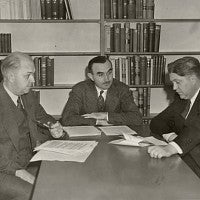
The Taft-Hartley bill sparked Morse’s most dramatic political fight for labor protections in the Senate. Morse believed that the wartime gains for labor were the bare minimum required for unions to operate fairly. With the passage of this bill, workers would lose their ability to form effective unions and maintain their balance of power with corporate leadership.
While unions provided workers an equal playing field on which to collectively bargain with employers, unions in turn offered employers a clearer path out of conflicts with workers. Unions had the potential both to resolve labor disputes in an efficient and cost-effective manner, and to ensure fair pay and working conditions for employees. Without this democratic relationship between workers and their employers, Morse feared, democratic society would perish.
The Taft-Hartley Act embodied this grim alternative, in Morse’s view. So when the House of Representatives overrode Truman’s presidential veto, Senator Morse braced himself for a fight against his own party in the Senate. Though he had been an outspoken opponent of the filibuster, Morse was prepared to use any means necessary to block the bill’s passage. Partnering up with two Democrats on a kind of filibuster relay team, Morse took the anchor leg and “argued to educate” for almost ten hours without straying from his subject. He relented only after Taft gave in to his call for further debate.
Despite this effort, the bill passed with exactly the same number of votes as before. The impact on labor rights was catastrophic. The Taft-Hartley Act ultimately paved the way to right-to-work states and union decertification in key industries during the economic recessions of the 1970s and 1980s.
Morse finally despaired of liberalizing the Republican Party when Eisenhower adopted the ultraconservative policies of the Taft-Hartley Act’s main author. After years of frustration, Morse left the party in 1952 to serve as an Independent. Though Morse joined the Democrats in 1955, he was in turn frustrated by their willingness to compromise on labor rights.
